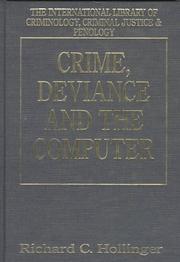| Listing 1 - 10 of 17 | << page >> |
Sort by
|
Book
ISBN: 0914894145 0273014927 9780273014928 Year: 1980 Publisher: London: Pitman,
Abstract | Keywords | Export | Availability | Bookmark
 Loading...
Loading...Choose an application
- Reference Manager
- EndNote
- RefWorks (Direct export to RefWorks)
Social change --- Computer. Automation --- 681.3*K2 --- 681.3*K42 --- History of computing: hardware; people; software; systems; theory --- Computerwetenschap--?*K42 --- 681.3*K2 History of computing: hardware; people; software; systems; theory --- Computers and civilization --- Computers --- Social aspects --- Computers - Social aspects

ISBN: 0134587790 9780134587790 Year: 1997 Publisher: Upper Saddle River (N.J.) : Prentice-Hall,
Abstract | Keywords | Export | Availability | Bookmark
 Loading...
Loading...Choose an application
- Reference Manager
- EndNote
- RefWorks (Direct export to RefWorks)
Computers --- Internet --- Social aspects --- Moral and ethical aspects --- informatica: en sociologie --- Moral and ethical aspects. --- Social aspects. --- Computers - Social aspects --- Computers - Moral and ethical aspects --- Internet - Social aspects --- Internet - Moral and ethical aspects

ISBN: 1855214679 9781855214675 Year: 1996 Publisher: Aldershot : Dartmouth,
Abstract | Keywords | Export | Availability | Bookmark
 Loading...
Loading...Choose an application
- Reference Manager
- EndNote
- RefWorks (Direct export to RefWorks)
Computer crimes --- Computer crimes. --- Computers --- Social aspects. --- Criminalité informatique --- Ordinateurs --- Social aspects --- Aspect social --- Computers and crime --- Cyber crimes --- Cybercrimes --- Electronic crimes (Computer crimes) --- Internet crimes --- Crime --- Privacy, Right of --- Computer crimes - United States. --- Computers - Social aspects.
Book
ISBN: 9781107038479 9781139828567 1107038472 1107777119 110777960X 1139828568 Year: 2014 Publisher: New York: Cambridge university press,
Abstract | Keywords | Export | Availability | Bookmark
 Loading...
Loading...Choose an application
- Reference Manager
- EndNote
- RefWorks (Direct export to RefWorks)
The internet has altered how people engage with each other in myriad ways, including offering opportunities for people to act distrustfully. This fascinating set of essays explores the question of trust in computing from technical, socio-philosophical, and design perspectives. Why has the identity of the human user been taken for granted in the design of the internet? What difficulties ensue when it is understood that security systems can never be perfect? What role does trust have in society in general? How is trust to be understood when trying to describe activities as part of a user requirement program? What questions of trust arise in a time when data analytics are meant to offer new insights into user behavior and when users are confronted with different sorts of digital entities? These questions and their answers are of paramount interest to computer scientists, sociologists, philosophers and designers confronting the problem of trust.
Computers --- Internet --- Trust --- Computer security --- Computer networks --- Information technology --- Social aspects --- Security measures --- Reliability --- Computers - Social aspects --- Internet - Social aspects --- Computer networks - Security measures --- Computer networks - Reliability --- Information technology - Social aspects --- Trust. --- Computer security. --- Social aspects. --- Security measures. --- Reliability.
Book
ISBN: 2707113670 9782707113672 Year: 1983 Volume: 374 Publisher: Paris: Maspero,
Abstract | Keywords | Export | Availability | Bookmark
 Loading...
Loading...Choose an application
- Reference Manager
- EndNote
- RefWorks (Direct export to RefWorks)
Computer architecture. Operating systems --- Third World: economic development problems --- Computer industry --- Electronic digital computers --- Ordinateurs --- Social aspects --- Industrie --- Aspect social --- Computers --- International economic relations --- -Computer industry --- -Computers --- -654.1 <7/8=6> --- Automatic computers --- Automatic data processors --- Computer hardware --- Computing machines (Computers) --- Electronic brains --- Electronic calculating-machines --- Electronic computers --- Hardware, Computer --- Computer systems --- Cybernetics --- Machine theory --- Calculators --- Cyberspace --- Electronic industries --- -Social aspects --- -Computer architecture. Operating systems --- 654.1 <7/8=6> --- Developing countries: economic development problems --- Computer industry - Latin America --- Computer industry - Developing countries --- Computers - Social aspects - Latin America --- Computers - Social aspects - Developing countries --- Télécommunications (technique, cable, sattélites,...)
Book
ISBN: 9782872098613 2872098615 Year: 2008 Volume: 2 Publisher: Louvain-la-Neuve: Academia-Bruylant,
Abstract | Keywords | Export | Availability | Bookmark
 Loading...
Loading...Choose an application
- Reference Manager
- EndNote
- RefWorks (Direct export to RefWorks)
Open source software --- Electronic villages (Computer networks) --- Community organization --- Logiciels libres --- Communautés virtuelles --- Organisation communautaire --- Social aspects --- Aspect social --- Free computer software --- Computers --- Debian (Computer system) --- Operating systems (Computers) --- Debian GNU (Computer file) --- Linux --- Debian Linux (système d'exploitation des ordinateurs) --- Informaticiens --- Sociologie --- Communautés virtuelles --- Informaticiens. --- Logiciels libres. --- Social aspects. --- Computers - Social aspects
Book
ISBN: 9782878545128 2878545125 Year: 2011 Publisher: Paris: Presses Sorbonne nouvelle,
Abstract | Keywords | Export | Availability | Bookmark
 Loading...
Loading...Choose an application
- Reference Manager
- EndNote
- RefWorks (Direct export to RefWorks)
L'écran devient un objet tellement évident dans la société actuelle qu'il en paraît transparent. Il sert d'accès à toutes sortes d'informations, que ce soit du texte, du son et de l'image fixe ou animée. Ce livre enquête sur son insertion progressive dans la société occidentale.
Television broadcasting --- Digital media --- Computers --- Mass media and culture --- Télévision --- Médias numériques --- Ordinateurs --- Médias et culture --- Social aspects --- Aspect social --- --Culture --- --Television --- Television --- Mass media and culture. --- Social aspects. --- Télévision --- Médias numériques --- Médias et culture --- Médias et culture. --- Aspect social. --- Culture --- Television - Social aspects --- Computers - Social aspects --- Digital media - Social aspects --- Médias et culture.
Book
ISBN: 9780262035927 9780262536042 9780262338837 0262338831 0262035928 0262536048 9780262338844 026233884X Year: 2017 Publisher: Cambridge The MIT Press
Abstract | Keywords | Export | Availability | Bookmark
 Loading...
Loading...Choose an application
- Reference Manager
- EndNote
- RefWorks (Direct export to RefWorks)
We depend on -- we believe in -- algorithms to help us get a ride, choose which book to buy, execute a mathematical proof. It's as if we think of code as a magic spell, an incantation to reveal what we need to know and even what we want. Humans have always believed that certain invocations -- the marriage vow, the shaman's curse -- do not merely describe the world but make it. Computation casts a cultural shadow that is shaped by this long tradition of magical thinking. In this book, Ed Finn considers how the algorithm -- in practical terms, a method for solving a problem -- has its roots not only in mathematical logic but also in cybernetics, philosophy, and magical thinking. Finn argues that the algorithm deploys concepts from the idealized space of computation in a messy reality, with unpredictable and sometimes fascinating results. Drawing on sources that range from Neal Stephenson's Snow Crash to Diderot's Encyclopedie, from Adam Smith to the Star Trek computer, Finn explores the gap between theoretical ideas and pragmatic instructions. He examines the development of intelligent assistants like Siri, the rise of algorithmic aesthetics at Netflix, Ian Bogost's satiric Facebook game Cow Clicker, and the revolutionary economics of Bitcoin. He describes Google's goal of anticipating our questions, Uber's cartoon maps and black box accounting, and what Facebook tells us about programmable value, among other things.If we want to understand the gap between abstraction and messy reality, Finn argues, we need to build a model of algorithmic reading and scholarship that attends to process, spearheading a new experimental humanities.Bron : http://www.bol.com
Information technology --- Computers --- Algorithms --- Algorithmes --- Ordinateurs --- Social aspects. --- Aspect social --- Algorism --- Algebra --- Arithmetic --- Foundations --- Aspect social. --- Algoritmi. --- Elaboratori elettronici - Aspetti sociali. --- Informatica - Aspetti sociali. --- Tecnologia - Aspetti sociali. --- Algoritmen --- Data --- Informatica --- Informatietechnologie --- Creativiteit --- Social aspects --- Algoritme --- IT --- Musiceren --- Information technology - Social aspects --- Computers - Social aspects --- Algorithms - Social aspects
Book
ISBN: 9780198799078 9780198713395 0198713398 0198799071 Year: 2017 Publisher: Oxford: Oxford university press,
Abstract | Keywords | Export | Availability | Bookmark
 Loading...
Loading...Choose an application
- Reference Manager
- EndNote
- RefWorks (Direct export to RefWorks)
This book predicts the decline of today's professions and describes the people and systems that will replace them. In an Internet society, according to Richard Susskind and Daniel Susskind, we will neither need nor want doctors, teachers, accountants, architects, the clergy, consultants, lawyers, and many others, to work as they did in the 20th century. The Future of the Professions explains how 'increasingly capable systems' - from telepresence to artificial intelligence - will bring fundamental change in the way that the 'practical expertise' of specialists is made available in society. The authors challenge the 'grand bargain' - the arrangement that grants various monopolies to today's professionals. They argue that our current professions are antiquated, opaque and no longer affordable, and that the expertise of the best is enjoyed only by a few. In their place, they propose six new models for producing and distributing expertise in society.
Professional employees --- Computers --- Internet --- Professions --- Artificial intelligence --- Computers and civilization --- Technological innovations --- Effect of technological innovations on --- Social aspects --- Labour economics --- Effect of technological innovations on. --- Social aspects. --- Professional employees - Effect of technological innovations on --- Computers - Social aspects --- Internet - Social aspects --- Artificial intelligence - Social aspects --- Technological innovations - Social aspects
Book
ISBN: 9782803105069 2803105063 Year: 2015 Volume: 2 2 Publisher: Bruxelles ARB
Abstract | Keywords | Export | Availability | Bookmark
 Loading...
Loading...Choose an application
- Reference Manager
- EndNote
- RefWorks (Direct export to RefWorks)
Informatique --- Systèmes virtuels --- Sociologie --- Aspect sociologique --- Influence --- Sociologie. --- Computers and civilization --- Computers --- Internet --- Artificial intelligence --- Sociology --- Social aspects --- Social aspects. --- Research --- Computer network resources --- Aspect sociologique. --- Computers - Social aspects --- Internet - Social aspects --- Artificial intelligence - Social aspects --- Sociology - Research - Computer network resources
| Listing 1 - 10 of 17 | << page >> |
Sort by
|

 Search
Search Feedback
Feedback About UniCat
About UniCat  Help
Help News
News